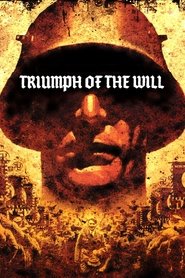Best seen today as a historical document of the time, rather than a wearisome skirmish over the definition of the word ‘propaganda’ or whether it would have convinced anyone at the time.
Still, Roger Ebert’s negative reappraisal of this film briefly summarised on the Wikipedia article) is of some interest to those intrigued by the United States’ contemporary attitude towards the Nazis and the Second World War. But he remains wrong that the film is “clumsy” in its messaging. It’s not entirely one note as he implies, even though I would concede that it’s all in the same key — the music especially so, in fact, with the marshall bands switching from the tonic and dominant with tedious inevitability. The film also reminds you how intensely factional the Nazi party was: despite all of their rhetoric about ‘one Reich’, we can plainly see an awful number of paramilitary organisations, army sections, elite guards, governmental departments and interest groups that each require their own salute… and no doubt careful juggling of political territory (and fragile egos) behind the scenes by Hitler as well, no doubt.
Anyway, Ebert ends his updated review with “a sobering thought” that:
Most of the people on the screen were dead within a few years.
A decidedly chilling remark, that. It not only feels somewhat unearned from the moral vantage-point of a cosy media class, it has a rather cruel and sadistic undertone which is magnified once you recall the large number of children in the film.
But did the film have any effect anyway? Surely that is the more urgent question over those undecidable question of the film's aesthetic qualities? It is probably impossible to be sure, but in Guy Pessach and Michal Shur's 2018 illuminating paper on the interface between Copyright and the Holocaust, they astutely point out "from the Nazi viewpoint, the [film] was so successful that after Triumph of the Will there was no need to make any other propaganda film about Hitler."
Anyway, I’d rather close this out by quoting Susan Sontag on the ever-crucial distance between the subject as depicted in a documentary and the object as it exists in reality:
To call Leni Riefenstahl’s The Triumph of the Will and The Olympiad masterpieces is not to gloss over Nazi propaganda with aesthetic lenience. The Nazi propaganda is there. But something else is there, too, which we reject at our loss. Because they project the complex movements of intelligence and grace and sensuousness, these two films of Riefenstahl (unique among works of Nazi artists) transcend the categories of propaganda or even reportage. And we find ourselves—to be sure, rather uncomfortably—seeing ‘Hitler’ and not Hitler, the ‘1936 Olympics’ and not the 1936 Olympics. Through Riefenstahl’s genius as a film-maker, the ‘content’ has—let us even assume, against her intentions—come to play a purely formal role.”
(Unrelated: An entire book could be written on the ethical and legal dimensions of the copyright to this film.)
It is generally thought that National Socialism stands only for brutishness and terror. But this is not true. National Socialism—or, more broadly, fascism—also stands for an ideal, and one that is also persistent today, under other banners: the ideal of life as art, the cult of beauty, the fetishism of courage, the dissolution of alienation in ecstatic feelings of community; the repudiation of the intellect; the family of man (under the parenthood of leaders).These ideals are vivid and moving to many people, and it is dishonest—and tautological—to say that one is affected by Triumph of the Will and Olympiad because they were made by a film maker of genius. Riefenstahl’s films are still effective because, among other reasons, their longings are still felt, because their content is a romantic ideal to which many continue to be attached.
— Susan Sontag (New York Review of Books, 1975)
We can never know. We no longer know who's speaking. The films of that time have become our memories, as if through some horrendous magic spell. The World War and its preamble are swept along in this endless movie, leaving us unable to distinguish between true and false. And since the Reich recruited more filmmakers, directors, cameramen, sound engineers, and stagehands than any other protagonist in this drama, we can say that our images of the war, at least before the Russians and Americans entered it, will for ever be directed by Joseph Goebbels. History unspools before our eyes, like a film by Joseph Goebbels. It's extraordinary.
— Éric Vuillard: The Order of the Day (2017)

